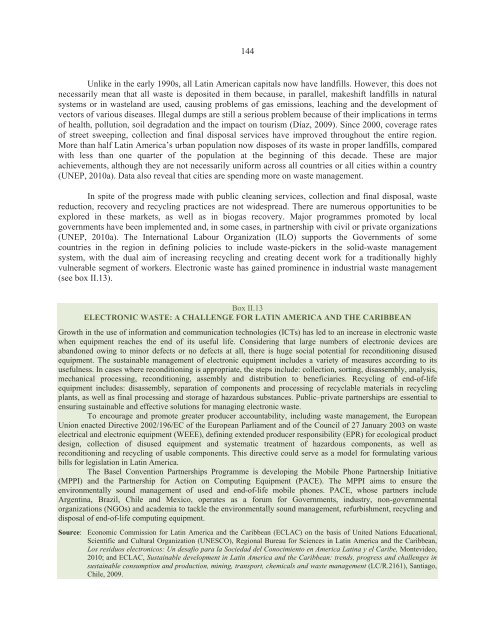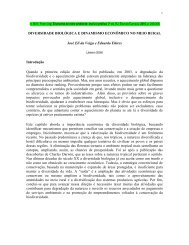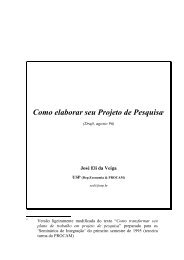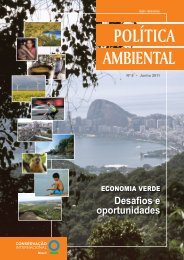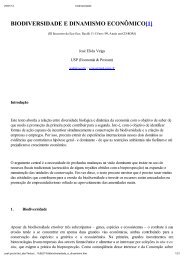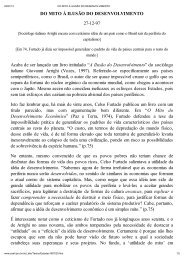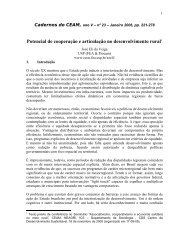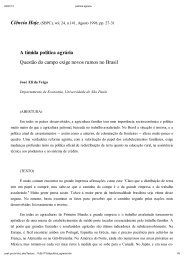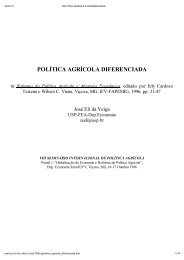sustainable development 20 years on from the ... - José Eli da Veiga
sustainable development 20 years on from the ... - José Eli da Veiga
sustainable development 20 years on from the ... - José Eli da Veiga
You also want an ePaper? Increase the reach of your titles
YUMPU automatically turns print PDFs into web optimized ePapers that Google loves.
144<br />
Unlike in <strong>the</strong> early 1990s, all Latin American capitals now have landfills. However, this does not<br />
necessarily mean that all waste is deposited in <strong>the</strong>m because, in parallel, makeshift landfills in natural<br />
systems or in wasteland are used, causing problems of gas emissi<strong>on</strong>s, leaching and <strong>the</strong> <str<strong>on</strong>g>development</str<strong>on</strong>g> of<br />
vectors of various diseases. Illegal dumps are still a serious problem because of <strong>the</strong>ir implicati<strong>on</strong>s in terms<br />
of health, polluti<strong>on</strong>, soil degra<strong>da</strong>ti<strong>on</strong> and <strong>the</strong> impact <strong>on</strong> tourism (Díaz, <str<strong>on</strong>g>20</str<strong>on</strong>g>09). Since <str<strong>on</strong>g>20</str<strong>on</strong>g>00, coverage rates<br />
of street sweeping, collecti<strong>on</strong> and final disposal services have improved throughout <strong>the</strong> entire regi<strong>on</strong>.<br />
More than half Latin America’s urban populati<strong>on</strong> now disposes of its waste in proper landfills, compared<br />
with less than <strong>on</strong>e quarter of <strong>the</strong> populati<strong>on</strong> at <strong>the</strong> beginning of this decade. These are major<br />
achievements, although <strong>the</strong>y are not necessarily uniform across all countries or all cities within a country<br />
(UNEP, <str<strong>on</strong>g>20</str<strong>on</strong>g>10a). Data also reveal that cities are spending more <strong>on</strong> waste management.<br />
In spite of <strong>the</strong> progress made with public cleaning services, collecti<strong>on</strong> and final disposal, waste<br />
reducti<strong>on</strong>, recovery and recycling practices are not widespread. There are numerous opportunities to be<br />
explored in <strong>the</strong>se markets, as well as in biogas recovery. Major programmes promoted by local<br />
governments have been implemented and, in some cases, in partnership with civil or private organizati<strong>on</strong>s<br />
(UNEP, <str<strong>on</strong>g>20</str<strong>on</strong>g>10a). The Internati<strong>on</strong>al Labour Organizati<strong>on</strong> (ILO) supports <strong>the</strong> Governments of some<br />
countries in <strong>the</strong> regi<strong>on</strong> in defining policies to include waste-pickers in <strong>the</strong> solid-waste management<br />
system, with <strong>the</strong> dual aim of increasing recycling and creating decent work for a traditi<strong>on</strong>ally highly<br />
vulnerable segment of workers. Electr<strong>on</strong>ic waste has gained prominence in industrial waste management<br />
(see box II.13).<br />
Box II.13<br />
ELECTRONIC WASTE: A CHALLENGE FOR LATIN AMERICA AND THE CARIBBEAN<br />
Growth in <strong>the</strong> use of informati<strong>on</strong> and communicati<strong>on</strong> technologies (ICTs) has led to an increase in electr<strong>on</strong>ic waste<br />
when equipment reaches <strong>the</strong> end of its useful life. C<strong>on</strong>sidering that large numbers of electr<strong>on</strong>ic devices are<br />
aband<strong>on</strong>ed owing to minor defects or no defects at all, <strong>the</strong>re is huge social potential for rec<strong>on</strong>diti<strong>on</strong>ing disused<br />
equipment. The <str<strong>on</strong>g>sustainable</str<strong>on</strong>g> management of electr<strong>on</strong>ic equipment includes a variety of measures according to its<br />
usefulness. In cases where rec<strong>on</strong>diti<strong>on</strong>ing is appropriate, <strong>the</strong> steps include: collecti<strong>on</strong>, sorting, disassembly, analysis,<br />
mechanical processing, rec<strong>on</strong>diti<strong>on</strong>ing, assembly and distributi<strong>on</strong> to beneficiaries. Recycling of end-of-life<br />
equipment includes: disassembly, separati<strong>on</strong> of comp<strong>on</strong>ents and processing of recyclable materials in recycling<br />
plants, as well as final processing and storage of hazardous substances. Public–private partnerships are essential to<br />
ensuring <str<strong>on</strong>g>sustainable</str<strong>on</strong>g> and effective soluti<strong>on</strong>s for managing electr<strong>on</strong>ic waste.<br />
To encourage and promote greater producer accountability, including waste management, <strong>the</strong> European<br />
Uni<strong>on</strong> enacted Directive <str<strong>on</strong>g>20</str<strong>on</strong>g>02/196/EC of <strong>the</strong> European Parliament and of <strong>the</strong> Council of 27 January <str<strong>on</strong>g>20</str<strong>on</strong>g>03 <strong>on</strong> waste<br />
electrical and electr<strong>on</strong>ic equipment (WEEE), defining extended producer resp<strong>on</strong>sibility (EPR) for ecological product<br />
design, collecti<strong>on</strong> of disused equipment and systematic treatment of hazardous comp<strong>on</strong>ents, as well as<br />
rec<strong>on</strong>diti<strong>on</strong>ing and recycling of usable comp<strong>on</strong>ents. This directive could serve as a model for formulating various<br />
bills for legislati<strong>on</strong> in Latin America.<br />
The Basel C<strong>on</strong>venti<strong>on</strong> Partnerships Programme is developing <strong>the</strong> Mobile Ph<strong>on</strong>e Partnership Initiative<br />
(MPPI) and <strong>the</strong> Partnership for Acti<strong>on</strong> <strong>on</strong> Computing Equipment (PACE). The MPPI aims to ensure <strong>the</strong><br />
envir<strong>on</strong>mentally sound management of used and end-of-life mobile ph<strong>on</strong>es. PACE, whose partners include<br />
Argentina, Brazil, Chile and Mexico, operates as a forum for Governments, industry, n<strong>on</strong>-governmental<br />
organizati<strong>on</strong>s (NGOs) and academia to tackle <strong>the</strong> envir<strong>on</strong>mentally sound management, refurbishment, recycling and<br />
disposal of end-of-life computing equipment.<br />
Source: Ec<strong>on</strong>omic Commissi<strong>on</strong> for Latin America and <strong>the</strong> Caribbean (ECLAC) <strong>on</strong> <strong>the</strong> basis of United Nati<strong>on</strong>s Educati<strong>on</strong>al,<br />
Scientific and Cultural Organizati<strong>on</strong> (UNESCO), Regi<strong>on</strong>al Bureau for Sciences in Latin America and <strong>the</strong> Caribbean,<br />
Los residuos electr<strong>on</strong>icos: Un desafio para la Socie<strong>da</strong>d del C<strong>on</strong>ocimiento en America Latina y el Caribe, M<strong>on</strong>tevideo,<br />
<str<strong>on</strong>g>20</str<strong>on</strong>g>10; and ECLAC, Sustainable <str<strong>on</strong>g>development</str<strong>on</strong>g> in Latin America and <strong>the</strong> Caribbean: trends, progress and challenges in<br />
<str<strong>on</strong>g>sustainable</str<strong>on</strong>g> c<strong>on</strong>sumpti<strong>on</strong> and producti<strong>on</strong>, mining, transport, chemicals and waste management (LC/R.2161), Santiago,<br />
Chile, <str<strong>on</strong>g>20</str<strong>on</strong>g>09.


